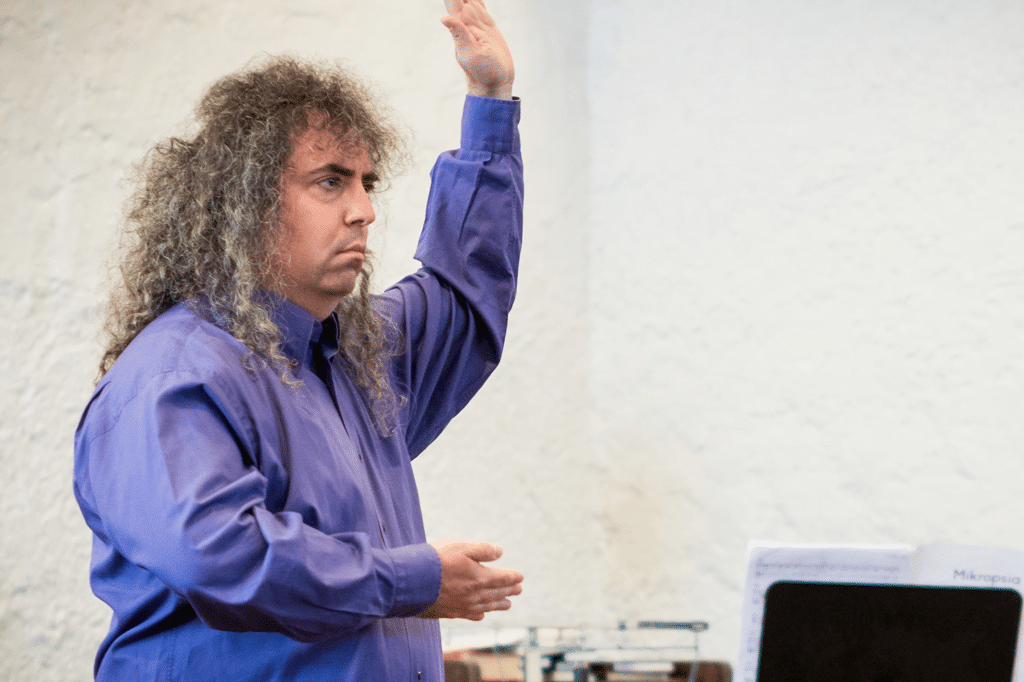Composed Theatre Collaboratory – Course description
The Time of Music 2022 Composed Theater Collaboratory invites participants to work as polyartists in a performative space of intersecting artistic disciplines, and to create a large-scale work together. Composers, improvisers, performers, and composer-performers — as well as artists working in any media (dancers and choreographers, actors, visual artists, film makers, performance artists, spoken word poets, etc.) — are welcome. A focus of the course will be the creation of small “composed theater” works involving physical gesture and choreographed events for performing musicians.
Today’s artist practitioners often maintain a hybrid identity with roles in both the creation and interpretation of artistic content. For those participants identifying principally as content creators, they will be invited to make small works in collaboration with individual instrumentalists from the acclaimed Frankfurt-based IEMA through preliminary online meetings in advance of the course, and then in rehearsal in Finland. Those identifying more as interpreters will be invited to prepare small composed theater works in advance of the course and present them in a masterclass setting. Others may elect to participate in the course without prior preparation.
All participants will then be involved in the collaborative composition of a culminating concert-length work — or installation or circus or some other emergent modality, TBD — to be presented at the conclusion of the course. This event will combine all of the aforementioned content modules (in some combination of juxtaposition and superimposition, with newly invented transitions, in consideration of both coordination and cohabitation paradigms, and in one or more simultaneous venues) along with a video notebook the class will make of on-site films of composed theater performances throughout Viitasaari in idiosyncratic, “beautifully quotidien” locations (for example, in a forest, on a lake, in a gas station, in a supermarket, near train tracks, on a factory loading dock, in a parking garage, at a pizza restaurant, etc.).
The course is limited to ten (enthusiastic, open-minded, community-oriented, curious, experimentally-tolerant, and creative) students. The age limit for the course is 32 years (born after 1.7.1990). The course is taught in English.
The course fee includes participation in the course, open lessons and workshops, and free entrance to all of the festival concerts.
The course is a part of Ulysses Network Project, which is supported by Creative Europe
Applications
When submitting an application please include a letter of motivation that describes your artistic profile: will you participate as a composer, composer-performer, instrumentalist or vocalist, visual artist, choreographer, filmmaker, polyartist working in multiple media, etc? Please explain how you would be most inclined to participate (e.g., as a composer collaborating with an instrumentalist on a short piece, as an instrumentalist with specific skills, as a performance artist with particular abilities, etc.). Optionally, attach or link to supplemental materials that represent your past experience and aspirations for the course (e.g., scores, performance videos, collaborative idea proposals, etc.).
Please submit the application at the latest March 31th.
Mark Applebaum
Mark Applebaum who currently holds the Leland and Edith Smith Professor position of Composition at Standorf University received his Ph.D. in composition from the University of California at San Diego where he studied principally with Brian Ferneyhough. His solo, chamber, choral, orchestral, operatic, and electroacoustic work has been performed throughout North and South America, Europe, Africa, Australia, and Asia with notable performances at the Darmstadt Summer Academy. He visited Time of Music for the first time as a lauded teacher and composer in 2017. The course was a great success.
Many of his pieces are characterized by challenges to the conventional boundaries of musical ontology: works for three conductors and no players, a concerto for florist and orchestra, pieces for instruments made of junk, notational specifications that appear on the faces of custom wristwatches, works for an invented sign language choreographed to sound, amplified Dadaist rituals, and a 72-foot long graphic score displayed in a museum and accompanied by no instructions for its interpretation. His TED Talk—about boredom—has been seen by more than two million viewers.
Applebaum has engaged in many intermedia collaborations, including neural artists, film-makers, florists, animators, architects, choreographers, and laptop DJs. He has received commissions from Betty Freeman, the Merce Cunningham Dance Company, the Fromm Foundation, the Kronos Quartet, the Vienna Modern Festival, the Paul Dresher Ensemble, the St. Lawrence String Quartet, the Meridian Arts Ensemble, Chamber Music America, the Spoleto Festival, and numerous others.
Applebaum is also an accomplished jazz pianist who has performed from Sumatra to Ouagadougou and who concertizes internationally with his father, Bob Applebaum, in the Applebaum Jazz Piano Duo. His music appears on the Innova, Tzadik, Capstone, Blue Leaf, SEAMUS, New Focus, ChampD’Action, and Evergreen labels.
Applebaum has held professorial positions at Carleton College and Mississippi State University. He subsequently taught classes in Antwerp, Santiago, Singapore, Paris, Amsterdam, and Oxford. In 2000 he joined the faculty at Stanford where he directs [sic]—the Stanford Improvisation Collective, received the 2003 Walter J. Gores Award for excellence in teaching, and was named the Hazy Family University Fellow in Undergraduate Education and Leland & Edith Smith Faculty Scholar.For more information:

